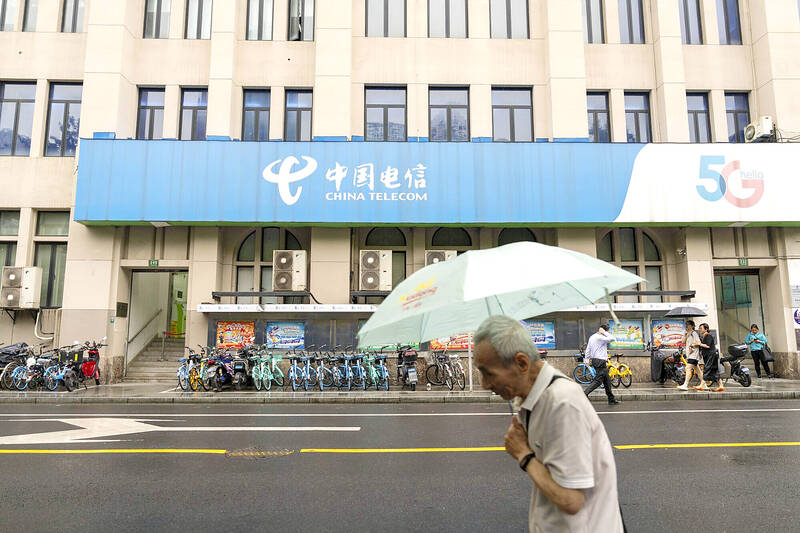US President Joe Biden’s administration is investigating China Mobile Ltd (中國移動), China Telecom Corp (中國電信) and China Unicom Hong Kong Ltd (中國聯通) over concerns the firms could exploit access to US data through their US cloud and Internet businesses by providing them to Beijing, three sources familiar with the matter said.
Authorities at the US Department of Commerce are running the investigation, which has not been previously reported. They have subpoenaed the state-backed companies and have completed “risk-based analyses” of China Mobile and China Telecom, but are not as advanced in their probe of China Unicom, the people said, declining to be named because the probe is not public.
The companies have long been in Washington’s crosshairs. The US Federal Communications Commission (FCC) denied China Mobile’s application to provide telephone service in 2019 and revoked China Telecom and China Unicom’s licenses to do the same in 2021 and 2022 respectively. In April, the FCC barred the companies from providing broadband service.

Photo: Bloomberg
The companies still have a small presence in the US, providing cloud services and routing wholesale US Internet traffic. That gives them access to US data even after telecom regulators barred them from providing telephone and retail Internet services in the nation.
The Chinese companies and their US-based lawyers did not respond to requests for comment. The US Department of Justice declined to comment and the White House referred questions to the commerce department, which declined to comment.
The Chinese embassy in Washington said it hopes the US would “stop suppressing Chinese companies under false pretexts,” adding that China would continue to defend the rights and interests of Chinese companies.
The investigation is the latest effort by Washington to prevent Beijing from exploiting Chinese firms’ access to US data to harm companies, Americans or national security, as part of a deepening tech war between the geopolitical rivals. It shows the administration is trying to shut down all remaining avenues for Chinese companies already targeted by Washington to obtain US data.
Regulators have not yet made decisions about how to address the potential threat, two of the people said.
However, equipped with the authority to probe Internet services sold into the US by companies from “foreign adversary” nations, regulators could block transactions allowing them to operate in data centers and route data for Internet providers, the sources said.
Blocking key transactions, in turn, could degrade the Chinese firms’ ability to offer competitive US-facing cloud and Internet services to global customers, crippling their remaining US businesses, experts and sources said.
The commerce department “must rigorously use its ... authorities to protect US data and infrastructure from Chinese companies like China Telecom,” US Representative and Committee on Foreign Affairs chairman Michael McCaul said in a statement.
“As one of our top adversaries, China cannot and should not ever be trusted to have access to Americans’ private data,” he added.

To many, Tatu City on the outskirts of Nairobi looks like a success. The first city entirely built by a private company to be operational in east Africa, with about 25,000 people living and working there, it accounts for about two-thirds of all foreign investment in Kenya. Its low-tax status has attracted more than 100 businesses including Heineken, coffee brand Dormans, and the biggest call-center and cold-chain transport firms in the region. However, to some local politicians, Tatu City has looked more like a target for extortion. A parade of governors have demanded land worth millions of dollars in exchange

An Indonesian animated movie is smashing regional box office records and could be set for wider success as it prepares to open beyond the Southeast Asian archipelago’s silver screens. Jumbo — a film based on the adventures of main character, Don, a large orphaned Indonesian boy facing bullying at school — last month became the highest-grossing Southeast Asian animated film, raking in more than US$8 million. Released at the end of March to coincide with the Eid holidays after the Islamic fasting month of Ramadan, the movie has hit 8 million ticket sales, the third-highest in Indonesian cinema history, Film

Taiwan Semiconductor Manufacturing Co’s (TSMC, 台積電) revenue jumped 48 percent last month, underscoring how electronics firms scrambled to acquire essential components before global tariffs took effect. The main chipmaker for Apple Inc and Nvidia Corp reported monthly sales of NT$349.6 billion (US$11.6 billion). That compares with the average analysts’ estimate for a 38 percent rise in second-quarter revenue. US President Donald Trump’s trade war is prompting economists to retool GDP forecasts worldwide, casting doubt over the outlook for everything from iPhone demand to computing and datacenter construction. However, TSMC — a barometer for global tech spending given its central role in the

Alchip Technologies Ltd (世芯), an application-specific integrated circuit (ASIC) designer specializing in server chips, expects revenue to decline this year due to sagging demand for 5-nanometer artificial intelligence (AI) chips from a North America-based major customer, a company executive said yesterday. That would be the first contraction in revenue for Alchip as it has been enjoying strong revenue growth over the past few years, benefiting from cloud-service providers’ moves to reduce dependence on Nvidia Corp’s expensive AI chips by building their own AI accelerator by outsourcing chip design. The 5-nanometer chip was supposed to be a new growth engine as the lifecycle